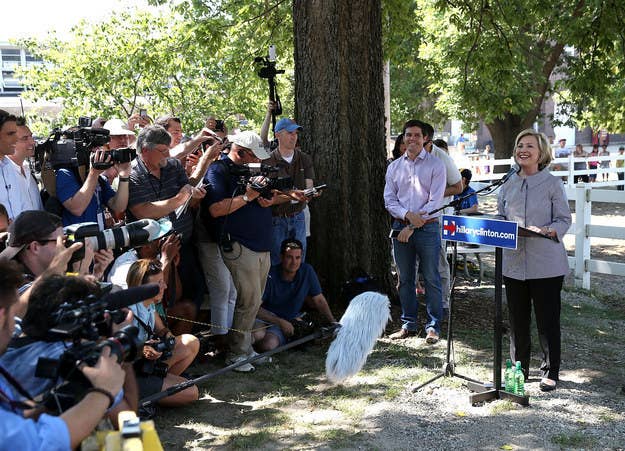
DES MOINES, Iowa — On Friday night — with one quick, subtle transition during a speech in northern Iowa — Hillary Clinton made a defiant shift in her approach to the email story still weighing on her campaign. The Republican-led Benghazi investigation isn’t “about Benghazi,” Clinton said. “You know what,” she added swiftly, “it’s not about emails or servers either. It’s about politics.”
The next day, before a tour through the Iowa State Fair, Clinton lumped the two inquiries together again. In response to a question about her personal email account, which she used to conduct government business as secretary of state, Clinton laid out a quick defense — “I never sent classified material on my email” — and then, without transition, was on to her next topic: Benghazi.
“I’m going to let whatever this inquiry is go forward, and will await the outcome of it,” Clinton said. “But I do think that if you look at the Republicans in Congress — the ones running for president — there is an unfortunate tendency to try to make partisan a tragedy in Benghazi, which I just fundamentally disagree with.”
“I don’t think it’s right and I will not participate in it. So we’ll see how this all plays out.”
There was little differentiation of the two very different scandals. One, Benghazi, continues to occupy headlines in the context of a Republican congressional investigation. The other, her emails, commands attention because of new, almost daily developments about her private server and the government’s investigation into it — regardless of the Republicans who do or do not hype the story.
But on Saturday, to Clinton, it was all about what she called "the usual partisanization” of “anything that goes on” in presidential politics.
And voters, Clinton added, just don’t have the time or interest. “It’s not anything that people talk to me about as I travel around the country," she said. "It is never raised in my town halls. It is never raised in my other meetings with people.”
Did she wonder if the story would hurt her chances in the election, a reporter asked, as Clinton took questions from a grassy spot on the state fairgrounds, standing alongside Tom Harkin, the former U.S. senator from Iowa.
Was that on her mind at all?
“No,” Clinton said flatly. “It’s not.”
“I’ve been at this for a really long time,” she added.
The Clintons have been at this for a very long time. They have, for decades, weathered many scandals, insisting along the way that every one has been created, or at least fueled, by the "vast right-wing conspiracy": Paula Jones, Gennifer Flowers, Travelgate, and the Whitewater investigation that became the Monica Lewinsky investigation that became the impeachment of Bill Clinton. On Friday, in the same speech, Clinton recalled a more recent attack: the 2008 film, Hillary: The Movie, financed by the conservative non-profit, Citizens United. And now, in her second presidential campaign, there's the Benghazi and email investigations.
The scandals, in Clinton's own view, come in cycles, and as she put it in a 1996 interview at the height of the Travelgate controversy, the only thing to do is continue beating the questions back. "Eventually they’re answered and they go away — and more questions come up. We’ll just keep plowing through and trying to get to the end of this.”
“Hopefully,” she said nearly 20 years ago, “it’ll end at some point.”
